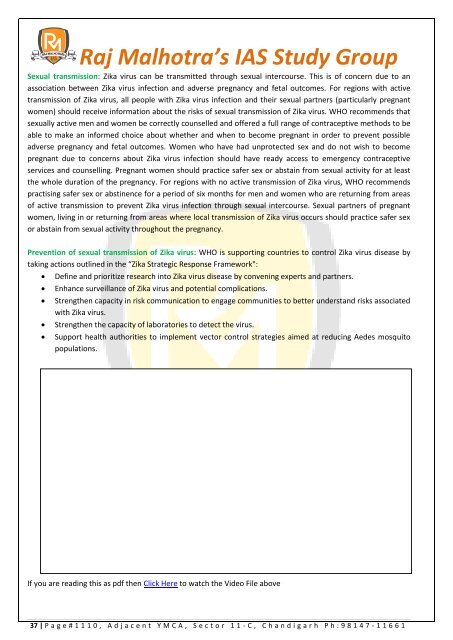Hard Facts 05 2017 (May)
You also want an ePaper? Increase the reach of your titles
YUMPU automatically turns print PDFs into web optimized ePapers that Google loves.
Raj Malhotra’s IAS Study Group<br />
Sexual transmission: Zika virus can be transmitted through sexual intercourse. This is of concern due to an<br />
association between Zika virus infection and adverse pregnancy and fetal outcomes. For regions with active<br />
transmission of Zika virus, all people with Zika virus infection and their sexual partners (particularly pregnant<br />
women) should receive information about the risks of sexual transmission of Zika virus. WHO recommends that<br />
sexually active men and women be correctly counselled and offered a full range of contraceptive methods to be<br />
able to make an informed choice about whether and when to become pregnant in order to prevent possible<br />
adverse pregnancy and fetal outcomes. Women who have had unprotected sex and do not wish to become<br />
pregnant due to concerns about Zika virus infection should have ready access to emergency contraceptive<br />
services and counselling. Pregnant women should practice safer sex or abstain from sexual activity for at least<br />
the whole duration of the pregnancy. For regions with no active transmission of Zika virus, WHO recommends<br />
practising safer sex or abstinence for a period of six months for men and women who are returning from areas<br />
of active transmission to prevent Zika virus infection through sexual intercourse. Sexual partners of pregnant<br />
women, living in or returning from areas where local transmission of Zika virus occurs should practice safer sex<br />
or abstain from sexual activity throughout the pregnancy.<br />
Prevention of sexual transmission of Zika virus: WHO is supporting countries to control Zika virus disease by<br />
taking actions outlined in the “Zika Strategic Response Framework":<br />
<br />
<br />
<br />
<br />
<br />
Define and prioritize research into Zika virus disease by convening experts and partners.<br />
Enhance surveillance of Zika virus and potential complications.<br />
Strengthen capacity in risk communication to engage communities to better understand risks associated<br />
with Zika virus.<br />
Strengthen the capacity of laboratories to detect the virus.<br />
Support health authorities to implement vector control strategies aimed at reducing Aedes mosquito<br />
populations.<br />
If you are reading this as pdf then Click Here to watch the Video File above<br />
37 | P a g e # 1 1 1 0 , A d j a c e n t Y M C A , S e c t o r 1 1 - C , C h a n d i g a r h P h : 9 8 1 4 7 - 1 1 6 6 1





